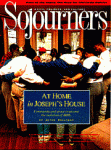With an ever tighter economy, socially conscious consumers are feeling a moral, as well as a financial, crunch: Do we buy cheaper at chain stores or do we pay more shopping locally? How do we do the right thing?
Most often these questions arise when people are purchasing gifts or shopping for groceries. But what about when buying books? The question may be more important than it seems.
Keeping Independent
Increasingly, consolidation is confusing the picture of the bookstore industry. For instance, B. Dalton, Waldenbooks, and Barnes & Noble, three stores often seen "competing" in North American malls, are actually all parts of the same corporation. It's a triune thing: three outlets, one business.
And, of course, large chain stores buy in mass quantities, and therefore can offer large discounts - sometimes as much as 40 percent - on bestsellers. Volume gives them leverage.
Thus small, independent stores can have difficulty competing with the megastores. They often cannot afford the rent of the large malls, so they must try to attract a faithful and committed local following. "If I had to compete with [the chain bookstores] on price alone, I would lose. But there are other ways to get people in your stores: local author readings, book-signings, specialty selections, good service," says David Unowsky, owner of the Hungry Mind, an independent bookstore in St. Paul.
Community service becomes the lifeline of the independent bookseller, just as it is for small downtown businesses. Unable to compete financially because of differences of scale, the indies need (and usually want) to provide a level of personal service that the bigger stores do not.
Unowsky explains, "With the new superstores, you see a new attempt by chains to increase their market share by doing what the independents did....They advertise a broad selection, including [books by] small presses and university presses; a professional staff; more space for reading. That is what independents have been doing for 15 years."
Why are the chains changing the way they do business? "More than half the books in America are not sold in bookstores. They are sold through mail order, by book club, in grocery stores," Unowsky quotes from a Book Industry Study Group investigation. "Of the remaining 48 percent, more are sold by independents than by chains, which is somewhat surprising, but three or four chains account for half of the books sold in [chain] bookstores. So publishers in a lot of ways cater to the chains.
"Unfortunately, when you have three or four buyers deciding, in essence, what publishers will print and what their print run will be and how much publicity they will provide, you have the danger of a narrower and narrower selection of books."
This necessarily brings up concerns about control of the market. But Unowsky is not overly worried. He says that the number of vibrant small presses will at least make alternative voices available even if, perhaps, difficult to find. This of course assumes outlets for small-press books, which again points out the importance of the independent bookstore.
"The wonderful thing about our business is that the things that we philosophically believe in are also the things that make us a good business. We believe in having lots of multicultural books, lots of poetry. We sell them because we think it is important. But these are markets the chains don't know how to do."
These days we can only hope that Unowsky's optimism is on target. In a nation that feels increasingly less kind and less gentle, it is vital that social institutions (both public and private) satisfy the demands of the alternative voices. Let's hope the independent bookstores can continue to provide this service.
Stay tuned.
Bob Hulteen was the Under Review editor of Sojourners when this article appeared.

Got something to say about what you're reading? We value your feedback!
